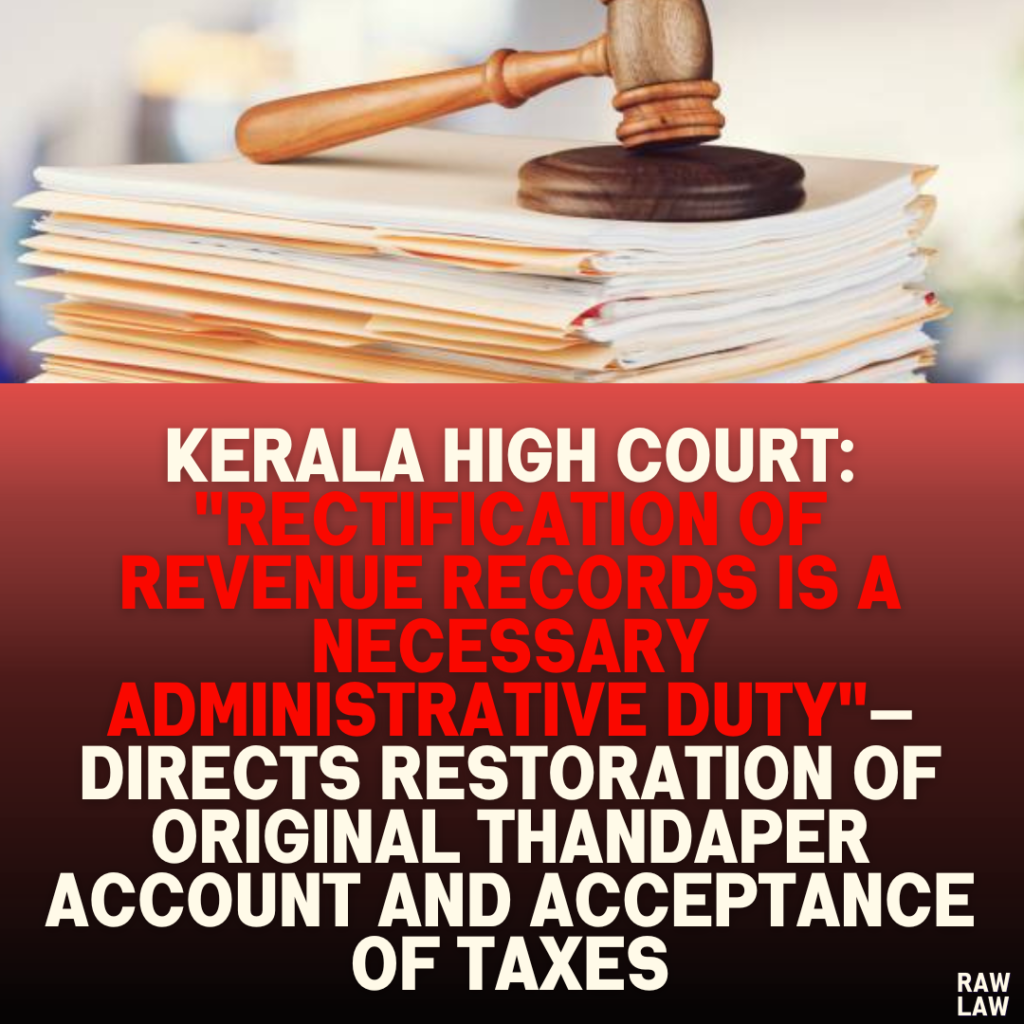Court’s Decision
The Kerala High Court directed the 2nd respondent (Tahisldar) to rectify errors in the revenue records and restore the petitioners’ original thandaper account within two months. Additionally, the court instructed the respondents to accept the tax from the petitioners for the disputed land.
Facts
The petitioners claimed ownership and possession of 36 cents of land in Re-Sy.No.180/1 in Vilavoorkkal Village. They had been paying taxes until 2022, after which the 3rd respondent refused to accept taxes for 2023 due to errors in the thandaper account, allegedly caused by mistakes in data entry into the Revenue E-Service Portal (RELIS). A request to rectify the issue was rejected via an order (Exhibit P10), leading to the present writ petition.
Issues
- Whether the petitioners are entitled to have the thandaper account rectified to reflect their ownership.
- Whether the respondents are obligated to accept the tax payments from the petitioners.
Petitioner’s Arguments
The petitioners argued that:
- They are the lawful owners of the property in question.
- The errors in the thandaper account were due to administrative mistakes made during the data entry into RELIS.
- Despite repeated representations, the respondents failed to address and correct the errors.
Respondent’s Arguments
The respondents, represented by the 2nd respondent (Tahisldar), admitted that the property is in the exclusive possession of the petitioners but attributed the issue to a mistake in the data entry of Village records, resulting in the property being incorrectly linked to five other thandaper holders.
Analysis of the Law
The court analyzed the petitioners’ right to rectify errors in revenue records based on ownership and possession and their entitlement to tax payment receipts. It emphasized the responsibility of the revenue authorities to ensure the accuracy of public records under applicable revenue laws and administrative principles.
Precedent Analysis
The court relied on general principles governing property rights and public record correction in similar cases where errors caused by administrative lapses led to disputes over revenue records.
Court’s Reasoning
The court acknowledged the 2nd respondent’s admission of the error in entering Village data. It found that the petitioners’ ownership and possession were undisputed and that the error arose due to lapses in data entry, not any fault of the petitioners. The court held that rectifying the records and accepting taxes was a necessary administrative function that could not be denied to the petitioners.
Conclusion
The court directed the 2nd respondent to:
- Rectify the errors in the thandaper account to reflect the petitioners’ ownership.
- Accept the petitioners’ tax payments for the land within two months of receiving the court’s judgment.
Implications
This judgment underscores the responsibility of revenue authorities to promptly rectify errors in public records to prevent unnecessary legal disputes. It also reaffirms property owners’ rights to accurate records and their ability to challenge administrative lapses effectively.




Pingback: Karnataka High Court Dismisses Civil Servant’s Petition Seeking Reinstatement after Resignation Accepted by Government: Once Accepted, Resignation is Irrevocable. - Raw Law